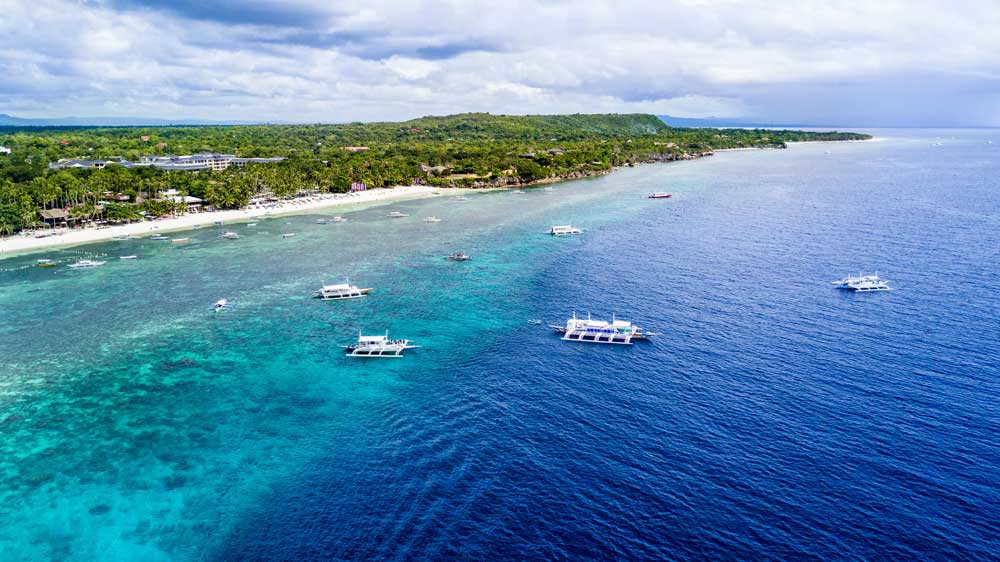
フィリピンのビサヤ諸島でダイブクルーズ体験
Your adventure on a liveaboard will unveil the wonders beneath the waves, revealing a world of vibrant coral gardens, mysterious wrecks, and schools of whimsical fish dancing in the gentle currents. The Visayas region has a rich history, with each island telling tales of the ancient civilizations that once thrived here. The blend of cultural heritage and natural beauty creates a unique backdrop to your underwater exploration.
Visayasダイブクルーズについて
From the elusive thresher sharks of Malapascua to the mesmerizing sardine runs of Moalboal, the Visayas promises an unforgettable diving adventure amidst the heart of the Philippines’ marine biodiversity.
The Visayas region in the Philippines is a diver's paradise, offering a range of unique diving experiences across its various sites. Best experienced with a Visayas liveaboard, here's a closer look at some of the prime diving destinations in this region:
マラパスクア: Known for its thresher shark encounters, マラパスクア Island is a jewel in the Visayas diving crown. Apart from thresher sharks, divers also frequently spot manta rays, hammerhead sharks, and a rich variety of smaller marine creatures. The dive sites here cater to all levels of divers, with Monad Shoal being the most famous for shark sightings.
ペスカドール島(モアルボアル): A marine park located near Moalboal, Pescador Island is celebrated for its vibrant coral walls and abundant marine life. The Cathedral, a cavern dive site, is one of the highlights here. The island is also home to schools of sardines, frogfish, and occasionally, whitetip sharks.
スミロン島: Known for its crystal clear waters, Sumilon Island offers stunning coral landscapes and a variety of marine life including reef sharks, rays, and a multitude of fish species. The island also has a marine sanctuary which has greatly helped in preserving the local marine ecosystem.
モアルボアル: ペスカドール島の向こうには、モアルボアル自体が フィリピン known for its sardine runs. The sight of millions of sardines swirling together in unison is a spectacle not to be missed. There are also numerous dive sites here suitable for all levels of divers, featuring beautiful coral gardens and diverse marine life.
アポ島(ネグロス): Leading the diving scene in Negros, Apo Island is a protected marine sanctuary. It's a haven for divers, boasting healthy coral reefs teeming with colorful marine life. Popular dive sites include Coconut Point and Chapel Point, each offering unique underwater landscapes and a variety of marine species.
ボホール島: The waters around Bohol are a playground for divers. Sites like Alona Beach and Panglao Island offer a mixture of wall, drift, and macro diving. The area is rich in coral gardens, small caves, and overhangs, housing a diverse range of marine life from nudibranchs to reef sharks.
バリカサグ島: A small island off the coast of Bohol, Balicasag is famed for its wall dives. The island’s steep walls are adorned with beautiful corals and are home to a variety of marine species including turtles, barracudas, and jacks. Diver's Heaven and Black Forest are among the popular dive sites here.
ビサヤに行くタイミングは?
The best time to visit the Visayas region in the Philippines for diving would be outside the typhoon season and the rainiest months, which occur from late November through February.
この期間、特に12月から2月にかけて、セブ、ボホール、レイテを含むビサヤ山脈東部は、アミハンの季節(北東モンスーン)が豪雨をもたらし、特に南レイテのダイビングスポットに影響を与えるため、湿潤な気候を経験しています。台風は11月から1月にかけても一般的で、特にレイテとセブ北部に影響を与えます。
The waters can get rough during either the northeast or southwest monsoon (Habagat) as winds stir up the waves, potentially affecting the diving conditions. However, it's mentioned that dive trips are still recommended year-round as dive operators are knowledgeable about the seasonal variations and can guide divers to sheltered areas offering great diving experiences despite the prevailing weather conditions.
より予測可能で楽しいダイビング体験を得るには、3月から11月初旬の間に訪問を計画することが理想的です。具体的には、一部のリブアボードは業務を Tubbataha 3月から6月にかけては、短いダイビングシーズンを利用しており、この期間がビサヤ地方でのダイビングに適していることも示唆されています。
旅行者へのヒント
ライブアボードの旅程は、天候やその他の予期せぬ状況に応じて変更される場合があります。快適な旅を確保するために、柔軟性を保ち、調整を受け入れるようにしてください。
偶発的な経費、チップ、または地元の停留所での少額の購入のために、フィリピンペソ( PHP )を手元に用意しておきましょう。大都市にはATMがありますが、遠隔地ではATMが不足しているか、利用できない場合があります。
旅行前に旅行保険とダイビング保険に加入しましょう。ビサヤフィリピンは人里離れた場所にあり、いくつかのダイビングスポットは最寄りの医療施設からかなり離れている可能性があります。
ビサヤ諸島のほとんどのリブアボードでは、オープンウォーターなどの最低限の経験が必要です。一部のダイビングサイトでは、高度な認定または特定の回数の記録されたダイビングを楽しむ必要があるため、最低限のダイビング体験を確認してください。
目的地と出発地への行き方は?
Cebu City and Malapascua are two common liveaboard departure locations for Visayas liveaboards. Cebu City is a booming metropolis and the regional capital of the Visayas, with a port that sends ferries, cargo ships, and liveaboards out in every direction. Getting to Cebu City is easy with a 1.5-hour flight from Manila or direct flights from select Southeast Asian countries nearby. International flights can get to Cebu City via a transfer in Asia. Conversely, Malapascua has no airport, but it can be reached by taxi, van, or bus (and small boat). From Cebu City, getting to Malapascua requires a five-hour bus journey; taxis take about half that time.
In addition to Cebu City and Malapascua, the Visayas region offers other departure points like Moalboal (in Cebu) and Dumaguete (in Negros) for some Philippines liveaboards due to the variety of destinations and itineraries. Moalboal can be reached by bus from Cebu City or by bus and a short ferry from Dumaguete. On the other hand, Dumaguete has its own airport with daily flights from Manila, making it a convenient point of entry. International travelers can also reach Dumaguete through connecting flights, typically with a layover in Manila or Cebu City. Upon arrival in Dumaguete, travelers can easily find transportation to the port where liveaboards are anchored, ready to embark on the underwater adventure.
ダイブクルーズアドベンチャーに欠かせない旅行のヒント
- 海洋公園料金: 1人あたり、1日あたりの海洋公園料金に注意してください。一部のリブアボードパッケージにはこれらの手数料が含まれていますが、船上での支払いが必要なものもあります。お支払い方法には、Visa、Mastercard、現金、トラベラーズチェックなどがあります。
- パスポートの有効期限:パスポートが入国予定日から少なくとも6か月間有効であることを確認してください。ほとんどの国では、往復航空券と一緒にこれを必要としています。ビザの要件を事前に確認してください。
- 健康上の準備:旅行の8週間前に、目的地で推奨される予防接種や予防措置について医師に相談してください。
注:追加の海洋公園料金や旅行要件については、選択したリブアボードの特定の利用規約を確認してください。
24時間年中無休でサポートいたします






